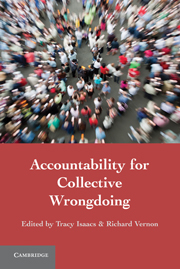Book contents
- Frontmatter
- Contents
- List of Contributors
- Acknowledgments
- Introduction
- PART I COLLECTIVE ACCOUNTABILITY IN INTERNATIONAL LAW
- 1 Collective Responsibility and Postconflict Justice
- 2 State Criminality and the Ambition of International Criminal Law
- 3 Punishing Genocide: A Critical Reading of the International Court of Justice
- 4 Joint Criminal Enterprise, the Nuremberg Precedent, and the Concept of “Grotian Moment”
- 5 Collective Responsibility and Transnational Corporate Conduct
- 6 Collective Punishment and Mass Confinement
- PART II DISTRIBUTING ACCOUNTABILITY
- Index
1 - Collective Responsibility and Postconflict Justice
Published online by Cambridge University Press: 05 June 2012
- Frontmatter
- Contents
- List of Contributors
- Acknowledgments
- Introduction
- PART I COLLECTIVE ACCOUNTABILITY IN INTERNATIONAL LAW
- 1 Collective Responsibility and Postconflict Justice
- 2 State Criminality and the Ambition of International Criminal Law
- 3 Punishing Genocide: A Critical Reading of the International Court of Justice
- 4 Joint Criminal Enterprise, the Nuremberg Precedent, and the Concept of “Grotian Moment”
- 5 Collective Responsibility and Transnational Corporate Conduct
- 6 Collective Punishment and Mass Confinement
- PART II DISTRIBUTING ACCOUNTABILITY
- Index
Summary
International lawmakers largely associate justice for atrocity with courtrooms and jailhouses, and therefore with international criminal law. These associations have captured the imagination of important constituencies, such as foreign-aid donors, not-for-profit advocacy networks, and transnational human rights entrepreneurs. Coincident with the emergence of international criminal law as the preferred ideal type of justice for atrocity is an understanding that individuals are responsible for mass crimes such as genocide and, accordingly, that individual criminal culpability is the optimal form of accountability – the “first-best” practice. This paradigm effectively emerged at Nuremberg, where the International Military Tribunal (IMT) intoned that the crimes in question were not the crimes of abstract entities but the “crimes of men” and, what is more, that “only by punishing individuals who commit such crimes can the provisions of international law be enforced.” After lying fallow for several decades, this paradigm has recently bloomed with the creation of several international and internationalized criminal tribunals.
Because of the iconic (others use the term “dominant”) status of the atrocity trial, international criminal tribunals attract a vastly disproportionate amount of resources, intellectual effort, hope, and faith – even though such tribunals represent only one among many possible modalities of justice. The iconography of the atrocity trial pulls our gaze away from these other justice modalities, such as truth and reconciliation commissions, indigenous forms of dispute resolution, and group-based sanctions that may implicate state, corporate, organizational, or collective responsibility.
- Type
- Chapter
- Information
- Accountability for Collective Wrongdoing , pp. 23 - 60Publisher: Cambridge University PressPrint publication year: 2011
- 3
- Cited by



